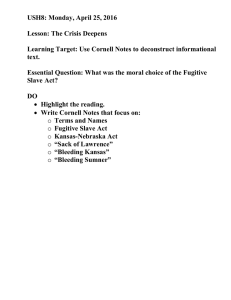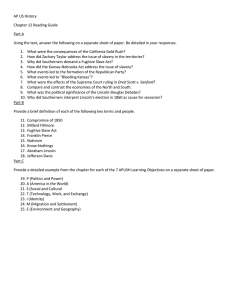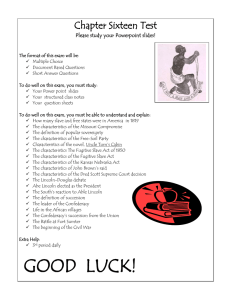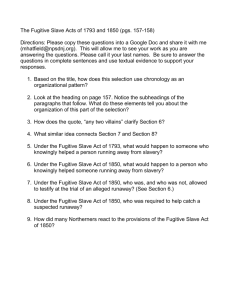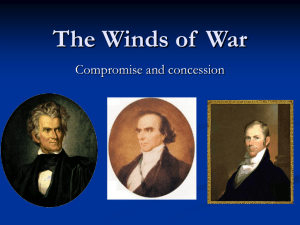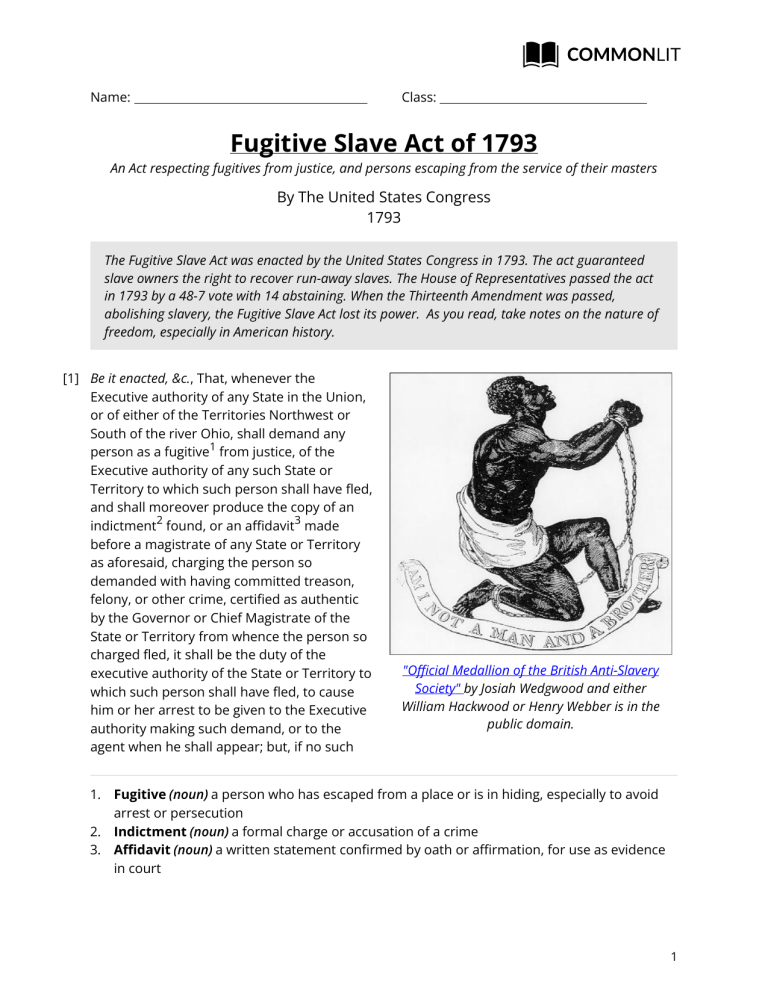
Name: Class: Fugitive Slave Act of 1793 An Act respecting fugitives from justice, and persons escaping from the service of their masters By The United States Congress 1793 The Fugitive Slave Act was enacted by the United States Congress in 1793. The act guaranteed slave owners the right to recover run-away slaves. The House of Representatives passed the act in 1793 by a 48-7 vote with 14 abstaining. When the Thirteenth Amendment was passed, abolishing slavery, the Fugitive Slave Act lost its power. As you read, take notes on the nature of freedom, especially in American history. [1] Be it enacted, &c., That, whenever the Executive authority of any State in the Union, or of either of the Territories Northwest or South of the river Ohio, shall demand any person as a fugitive1 from justice, of the Executive authority of any such State or Territory to which such person shall have fled, and shall moreover produce the copy of an indictment2 found, or an affidavit3 made before a magistrate of any State or Territory as aforesaid, charging the person so demanded with having committed treason, felony, or other crime, certified as authentic by the Governor or Chief Magistrate of the State or Territory from whence the person so charged fled, it shall be the duty of the executive authority of the State or Territory to which such person shall have fled, to cause him or her arrest to be given to the Executive authority making such demand, or to the agent when he shall appear; but, if no such "Official Medallion of the British Anti-Slavery Society" by Josiah Wedgwood and either William Hackwood or Henry Webber is in the public domain. 1. Fugitive (noun) a person who has escaped from a place or is in hiding, especially to avoid arrest or persecution 2. Indictment (noun) a formal charge or accusation of a crime 3. Affidavit (noun) a written statement confirmed by oath or affirmation, for use as evidence in court 1 agent shall appear within six months from the time of the arrest, the prisoner may be discharged: and all costs or expenses incurred in the apprehending, securing, and transmitting such fugitive to the State or Territory making such demand, shall be paid by such State or Territory. SEC. 2. And be it further enacted, That any agent appointed as aforesaid, who shall receive the fugitive into his custody, shall be empowered to transport him or her to the State or Territory from which he or she shall have fled. And if any person or persons shall, by force, set at liberty, or rescue the fugitive from such agent while transporting, as aforesaid, the person or persons so offending shall, on conviction, be fined not exceeding five hundred dollars, and be imprisoned not exceeding one year. SEC. 3. And be it also enacted, That when a person held to labor in any of the United States, or in either of the Territories on the Northwest or South of the river Ohio, under the laws thereof, shall escape into any other part of the said States or Territory, the person to whom such labor or service may be due, his agent or attorney, is hereby empowered to seize or arrest such fugitive from labor, and to take him or her before any Judge of the Circuit or District Courts of the United States, residing or being within the State, or before any magistrate of a county, city, or town corporate, wherein such seizure or arrest shall be made, and upon proof to the satisfaction of such Judge or magistrate, either by oral testimony or affidavit taken before and certified by a magistrate of any such State or Territory, that the person so seized or arrested, doth, under the laws of the State or Territory from which he or she fled, owe service or labor to the person claiming him or her, it shall be the duty of such Judge or magistrate to give a certificate thereof to such claimant,4 his agent, or attorney, which shall be sufficient warrant for removing the said fugitive from labor to the State or Territory from which he or she fled. SEC. 4. And be it further enacted, That any person who shall knowingly and willingly obstruct or hinder such claimant, his agent, or attorney, in so seizing or arresting such fugitive from labor, or shall rescue such fugitive from such claimant, his agent or attorney, when so arrested pursuant to the authority herein given and declared; or shall harbor or conceal such person after notice that he or she was a fugitive from labor, as aforesaid, shall, for either of the said offences, forfeit and pay the sum of five hundred dollars. Which penalty may be recovered by and for the benefit of such claimant, by action of debt, in any Court proper to try the same, saving moreover to the person claiming such labor or service his right of action for or on account of the said injuries, or either of them. The Fugitive Slave Act of 1793 by The United States Congress is in the public domain. Unless otherwise noted, this content is licensed under the CC BY-NC-SA 4.0 license 4. Claimant (noun) a person making a claim, such as in a court case 2 Discussion Questions Directions: Brainstorm your answers to the following questions in the space provided. Be prepared to share your original ideas in a class discussion. 1. How did prejudice influence the creation and enactment of the Fugitive Slave Act of 1793? 2. How do people decide who has access to this right of freedom? How do they justify restrictions upon freedom? 3. In the context of the text, what are the effects of prejudice? Cite evidence from this text, your own experience, and other art, literature, or history in your answer. 3
